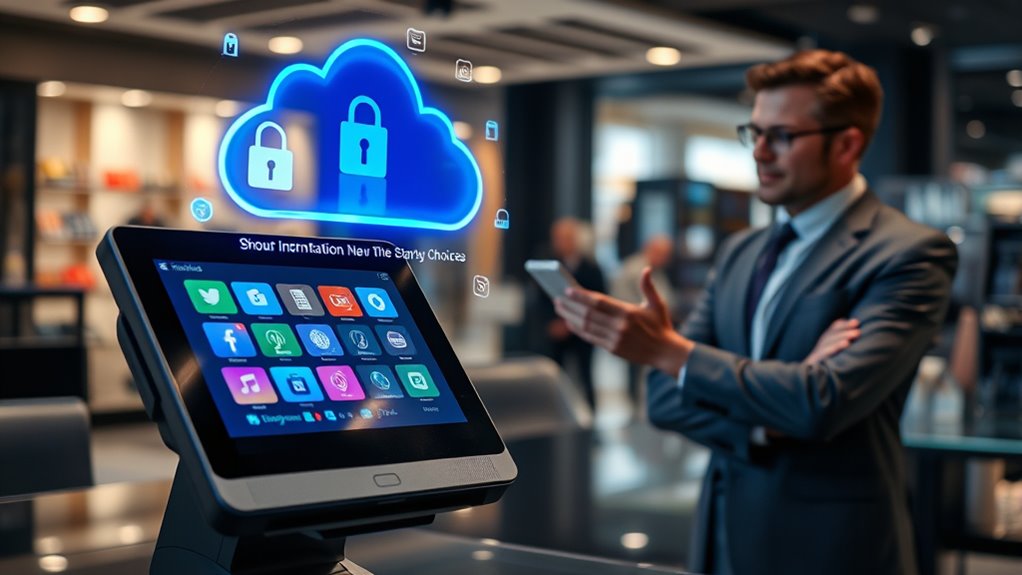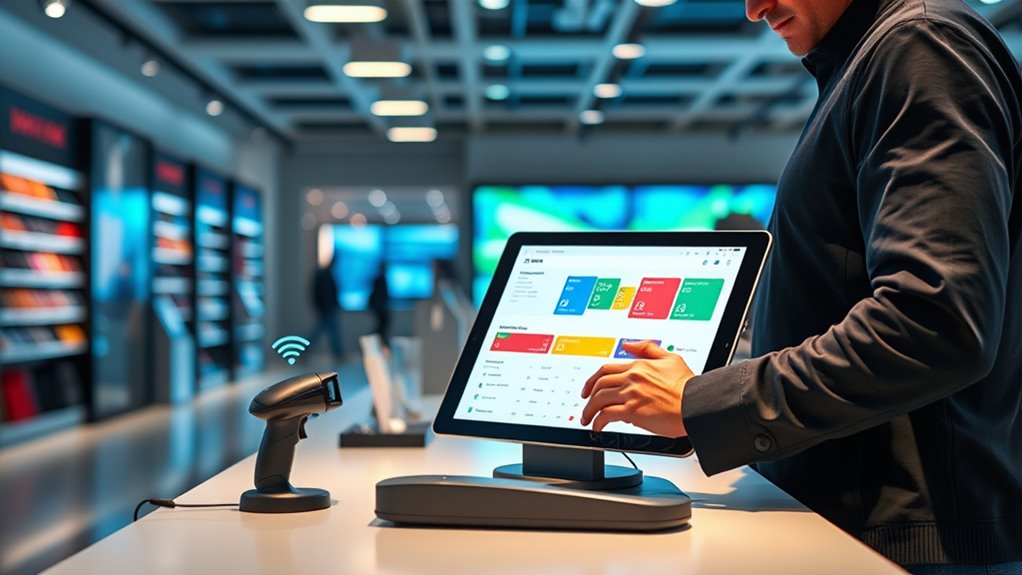To choose the right cloud-based POS in 2025, focus on systems with real-time inventory management, seamless integration with your current hardware and software, and strong security features like encryption and two-factor authentication. Prioritize scalability to accommodate growth and emerging technologies such as AI and mobile payments. Consider long-term costs versus benefits, including updates and support. Keep exploring options to find a solution that best aligns with your business needs and future expansion plans.
Key Takeaways
- Ensure the POS supports seamless integration with your existing systems like accounting and inventory management.
- Prioritize security features such as encryption, PCI DSS compliance, and two-factor authentication.
- Choose a scalable cloud-based solution that can grow with your business and handle increased transaction volumes.
- Assess user-friendliness and training requirements for quick onboarding and efficient daily operations.
- Consider cost-effectiveness, including upfront investments, long-term savings, and potential ROI from improved performance.
Key Features and Capabilities to Evaluate

When evaluating cloud‑based POS systems, focusing on key features and capabilities that will support your business operations effectively is vital. You should look for inventory management tools that allow real-time tracking and easy updates to keep your stock accurate. Seamless integration with your existing systems, such as accounting or e-commerce platforms, can streamline workflows. Payment processing options should be versatile, supporting various methods like credit cards, mobile payments, and contactless options. User-friendly interfaces are essential for quick training and daily use, reducing errors and increasing efficiency. Reporting and analytics features help you understand sales trends, customer preferences, and operational performance. Ultimately, scalability matters—ensure the system can grow with your business, accommodating additional locations or new sales channels without hassle. Additionally, considering solutions with Comfort and Support Solutions can enhance user experience and satisfaction among staff.
Security and Data Privacy Considerations

As you evaluate cloud-based POS systems, paying attention to security and data privacy is vital to protect your business and customer information. Make certain the system uses strong encryption for data transmission and storage, preventing unauthorized access. Look for providers that comply with industry standards like PCI DSS and GDPR, which demonstrate their commitment to data safety. Verify that they have robust user authentication methods, such as two-factor authentication, to limit access to sensitive data. Regular security updates and vulnerability assessments are also essential for keeping the system protected against emerging threats. Additionally, review the provider’s data privacy policies to understand how your data is stored, shared, and protected. Understanding covert narcissistic behaviors can help you recognize potential manipulation or emotional risks. Prioritizing these considerations helps safeguard your reputation and maintains customer trust.
Integration With Existing Systems and Devices

Integrating a cloud-based POS system seamlessly with your existing hardware and software guarantees smooth operations and minimizes disruptions. To guarantee compatibility, verify that your current devices, such as barcode scanners, receipt printers, and payment terminals, support the new system. Compatibility with your inventory management, accounting, and CRM software is also essential for efficient data flow. Additionally, check if the POS supports your preferred operating systems and network infrastructure. Proper integration reduces manual data entry, speeds up transactions, and improves overall customer experience. Be sure to consider bedroom design elements that facilitate a comfortable and efficient workspace if your POS setup is located in a dedicated office area.
Scalability and Future-Proofing

Ensuring your cloud-based POS can grow with your business means choosing a system designed for scalability and adaptability. Look for platforms that easily handle increased transaction volume, new store locations, and expanded product lines without requiring major upgrades. A future-proof POS offers regular updates, integrating emerging technologies like AI, mobile payments, or inventory automation. It should support modular features, so you can add or remove functionalities as needed. Cloud-based systems inherently provide flexibility, allowing remote management and quick deployment of new features. Choosing a scalable POS means investing in a solution that evolves with industry trends and your business’s growth, reducing the need for costly replacements down the line. Additionally, selecting a system that incorporates high refresh rates can enhance transaction processing speeds and user experience. This proactive approach ensures your system remains relevant, efficient, and ready for whatever the future holds.
Cost Analysis and Return on Investment

Evaluating the cost and potential return on investment (ROI) of a cloud-based POS is essential to making an informed decision. You need to contemplate not just the upfront costs but also long-term savings and efficiency gains. Cloud POS systems often reduce hardware expenses, lower maintenance costs, and improve transaction speed, boosting sales. To make a solid assessment, consider:
- Subscription fees versus one-time purchases
- Cost savings from reduced hardware and maintenance
- Increased sales or customer retention due to better performance
- Scalability benefits that support growth without major upgrades
- Incorporating wall organization systems can help optimize space in retail environments, enhancing overall customer experience and operational efficiency.
Frequently Asked Questions
How Often Are Cloud-Based POS Systems Updated?
You might wonder how often cloud-based POS systems get updates. Typically, these systems are updated regularly—sometimes monthly or quarterly—to improve features, security, and performance. Many providers push automatic updates, so you often won’t notice the changes. Staying current is vital for security and efficiency, so check your provider’s update schedule. If you want to maximize your system’s potential, make certain updates happen seamlessly without interrupting your business.
What Training Is Required for Staff to Use New POS?
You might think staff need extensive training for new POS systems, but many modern cloud-based options are designed for intuitive use. Typically, a brief onboarding session, hands-on practice, and accessible digital tutorials suffice. Some providers even offer ongoing support and updates, so your team can adapt quickly without lengthy training. This streamlined approach helps your staff master the system efficiently, ensuring smooth operations from the start.
Can the POS Handle Multiple Currencies and Languages?
When considering a POS system, you want to make certain it can handle multiple currencies and languages smoothly. You’ll need to check if the system supports your specific needs, like real-time currency conversions and language preferences. Make sure it’s flexible enough to adapt as your business grows or expands internationally. A good POS should simplify transactions for your staff and customers, regardless of their language or currency.
What Support Options Are Available During System Outages?
When considering support options during system outages, you want to guarantee reliable assistance. Many cloud-based POS providers offer 24/7 support through live chat, phone, or email. Some also provide offline mode, allowing transactions to continue seamlessly, with automatic sync once the system is back online. Check if your provider offers emergency support plans or dedicated account managers to help you quickly resolve issues and minimize downtime.
How Does the POS Adapt to Industry-Specific Needs?
You’re on the right track by considering how your POS adapts to industry-specific needs. Think of it as hitting two birds with one stone—finding a system tailored to your sector guarantees seamless operations and customer satisfaction. Look for customizable features, industry-relevant integrations, and flexible workflows. This way, your POS evolves with your business, addressing unique challenges and opportunities, making sure you stay ahead of the curve.
Conclusion
So, now you’re all set to pick the perfect cloud-based POS for 2025—because nothing screams excitement like data privacy and scalability, right? Just remember, while choosing a system that checks all your boxes might feel like solving a Rubik’s Cube blindfolded, it’s worth it when your business runs smoother than a well-oiled machine. Happy hunting—may your POS be as future-proof as your grandma’s old recipes!









